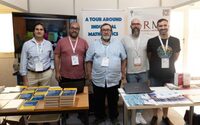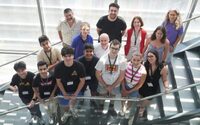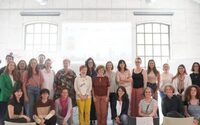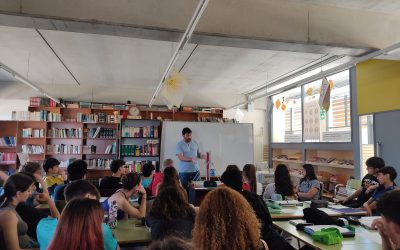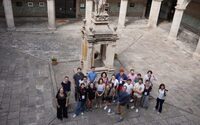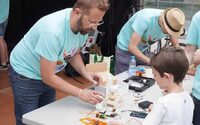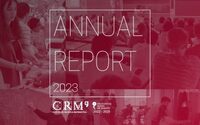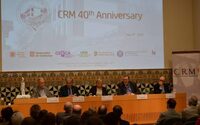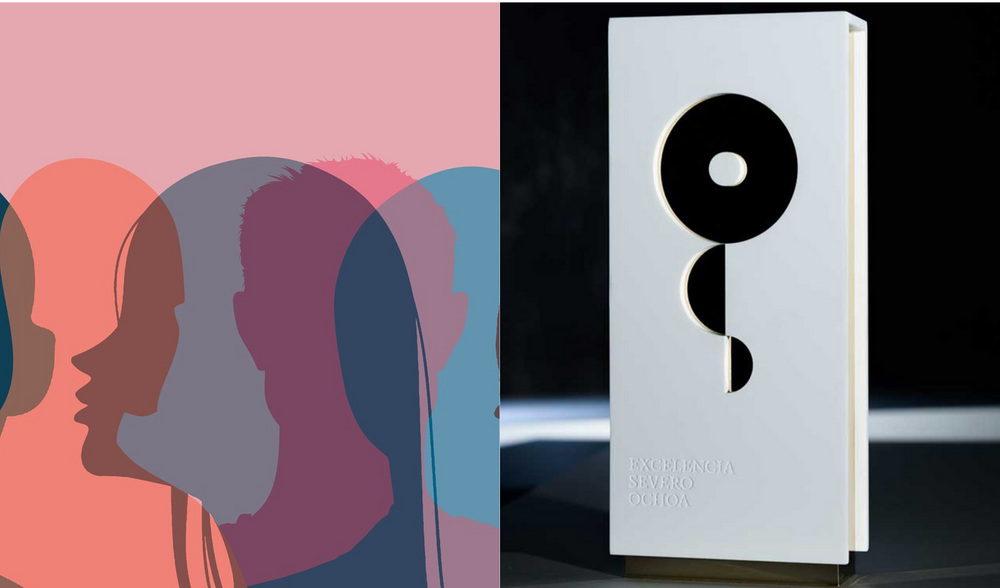
In the first months of the 2022-2023 academic year, 5 pre-docs and 9 post-docs have joined the CRM research staff, 7 of which were supported by the Maria de Maeztu (MdM) award. They have joined groups from a wide spectrum of fields, from Mathematical Biology to Algebra, including Industrial Mathematics and Dynamical Systems. This growth in the staff of the CRM is good news for the quality of the Catalan mathematical research.
One of the indicators of the success of the recruitment process that the CRM studies is the gender balance reached. In this occasion, 6 out of the 14 new researchers incorporated during the period are women. Moreover, parity is reached in both categories: 2 out of 5 pre-docs are women and in the case of post-docs, the number is 4 out of 9.
There exists a general problem in recruiting female talent in STEM disciplines. In academia, the problem grows bigger as the research stage is more advanced, what is called the retention of talent: many women start as a PhD, however, very few of them become Professors. This is one of the motivations of the CRM focusing on the post-doc category to try new and fair methods to boost women recruitments. The MdM postdoc programme has applied a gender-bias conscious campaign and selection process. For the first call, out of seven hired postdocs, three of them are women.
First of all, the dissemination of the MdM post-doc call was done with a carefully designed campaign. The call was posted in Mathematics webpages that reach out to women (e.g: Women in Mathematics), was mindful with the language used and aimed for inclusiveness.
Secondly, the recruitment and selection method focused on engaging women as evaluators at all stages. In the first stage, a remote evaluation was conducted with 2 experts per candidate. In the second and last stage, the shortlisted candidates -a minimum of 3 and maximum of 6 per position- were interviewed by a panel of 3 members. The panels had at least a woman in every case. This was applied due to an unconscious bias of the interviewer: the similarities to their own self observed in the interviewee affect positively in its evaluation, as a result of the projection of their own strengths. Therefore, a wider variety of interviewers also helps to increase the chances of a wider variety of people getting the job.
In the last place, the focus is put in trying to maximize the number of female candidates that arrive to the interview. After the first stage, results are reviewed by a Panel chair so, for example, if two scores for the same candidate are differing by 20%, the moderator calls for a consensus meeting with the two evaluators, and eventually, organizes a third evaluation for that candidate. The Panel moderator also hands out to the Recruitment Committee handling the process at CRM (headed by Director and MdM Scientific Director) a shortlist of the candidates to be interviewed. In the MdM post-doc call, the shortlist was requested to be extended as to include one woman.
Arantxa Sanz, CRM’s Head of Strategy and member of the CRM Equity Committee, has driven the introduction of the gender perspective in the recruitment process. She participated in the final workshops of the LIBRA H2020 Project (1), addressing gender equality in academia and how to articulate gender plans and actions deriving from them. More specifically, one of the project work packages was focused on recruitment without Gender Bias (2), from which some of the ideas that have been implemented in the CRM-MdM postdoc recruitment method were hinted (some of them previously tested for the CAFE-ITN). She also got advice from the Universitat Autònoma de Barcelona’s Equality Observatory and collected some cases of good practices (e.g. Those from Anita’s Borg Institute (3)). Facts and knowledge on strategies that work are needed since some procedures to increase the number of women in research are not as fruitful as it would seem. For example, opening positions just for women doesn’t lead to a long-term change. For structural transformations, more subtle and strategic adjustments need to be introduced.
In the soon-to-start year, another MdM post-doc selection process will start, hopefully with results as good as this first round. These actions are one of the measures in the CRM Equity Plan (21-23) and are aligned with the goal of making science more approachable and giving more people the opportunity to shape research. As Arantxa states, gender is the first step to open to more kinds of diversity.
References:
(1) LIBRA H2020 project: https://www.eu-libra.eu/
(2) LIBRA’s Work Package: Recruiting without Gender Bias: https://www.eu-libra.eu/work-packages/recruit-without-gender-bias
(3) Anita Borg’s Institute (Google-related foundation, focused on attracting and retaining more women into technological careers) material:
https://anitab.org/wp-content/uploads/2020/08/woc-case-study-2018.pdf

CRM Comm Team
Anna Drou | Pau Varela
CRMComm@crm.cat
Subscribe for more CRM News
CRM at the 9th European Congress of Mathematics
The 9th European Congress of Mathematics (9ECM) took place in Seville from July 15 to 19, 2024, with 1300 participants, featuring plenary lectures, invited talks, minisymposium talks, and thematic session presentations. CRM participated with...
Ten International High School Students Engage in Advanced Mathematics at CRM
The Centre de Recerca Matemàtica (CRM) hosted ten students from diverse countries during the Barcelona International Youth Science Challenge (BIYSC), engaging them in a comprehensive mathematics program that explored various facets of mathematics...
Los Sesgos Inconscientes: Reflexiones de la catedrática Capitolina Díaz
El viernes 14 de junio, la catedrática de sociología de la Universidad de Valencia, Capitolina Díaz, abordó un tema que afecta profundamente a nuestra sociedad: los sesgos inconscientes, y en particular, en el ámbito de la investigación. Empezó...
“Mates i a xalar” a la ràdio: xerrades de matemàtiques divulgatives a les Terres de l’Ebre
“Mates i a xalar” a la ràdio: xerrades de matemàtiques divulgatives a les Terres de l’Ebre El divendres 10 de maig, un grup d’investigadors del Centre de Recerca Matemàtica, en col·laboració amb el Centre d’Estudis de la Ribera d’Ebre (CERE), van...
Hypatia 2024
El passat dilluns 3 de juny va començar l’Hypatia 2024, un curs d’estiu que es va estendre fins dijous 6 de juny. L’Hypatia és una iniciativa per formar joves investigadors i investigadores i obrir nous camps d’estudi per aquells més sèniors,...
El CRM participa un any més a la Festa de la Ciència
El CRM participa un any més a la Festa de la CiènciaEl Centre de Recerca Matemàtica (CRM) va participar en la 17a Festa de la Ciència amb dos tallers: La La Lambda: Les Matemàtiques de la Música, que va explorar la relació entre les matemàtiques i...
The CRM’s 2023 Annual Report Highlights Growth and Collaboration
The CRM's 2023 Annual Report highlights significant growth, numerous publications, and new projects, emphasizing the center's status as an international leader in mathematical research. Key achievements include the attraction of new talent through...
New Scientific Research Sheds Light on Ecological Dynamics and Late Warning Signals in Conservation Efforts
CRM and CNRS researchers introduce a novel concept, Late Warning Signals (LWS), for aiding post-tipping point ecosystem recovery, enhancing resilience in biodiversity management. LWS may offer crucial insights for timely intervention in ecosystem...
The CRM participates in the MSCA-COFUND TOUCH Project
The CRM participates in the MSCA-COFUND TOUCH Project The MSCA-COFUND TOUCH project, spearheaded by the Universitat Autònoma de Barcelona (UAB), has been funded under the prestigious Marie Skłodowska-Curie Actions (MSCA) and the Horizon Europe...
Eva Miranda, Inclosa a la Iniciativa #científicasCASIO
Eva Miranda, destacada matemàtica catalana i catedràtica a la Universitat Politècnica de Catalunya, ha estat inclosa a la iniciativa #científicasCASIO coincidint amb el Dia Internacional de la Dona Matemàtica. Aquest projecte de la Divisió...
El CRM celebra quaranta anys com a referent internacional de les matemàtiques
El CRM celebra quaranta anys com a referent internacional de les matemàtiques El CRM celebra quaranta anys com a referent internacional de les matemàtiques El Centre de Recerca Matemàtica (CRM), fundat l'1 de gener de 1984, celebra el seu 40è...
Exploring Career Pathways for Mathematics Graduates: Insights from the ‘And after the Degree, What?’ Roundtable
The roundtable titled “And after the Degree, What?” held at the Universidad de La Rioja, during the Conference of Deans of Mathematics, explored various career options for mathematics graduates, such as academia and industry. David Romero, head of the Knowledge Transfer Unit (KTU) at CRM, discussed the unique aspects of industrial PhDs, emphasizing their value in producing highly qualified professionals.


